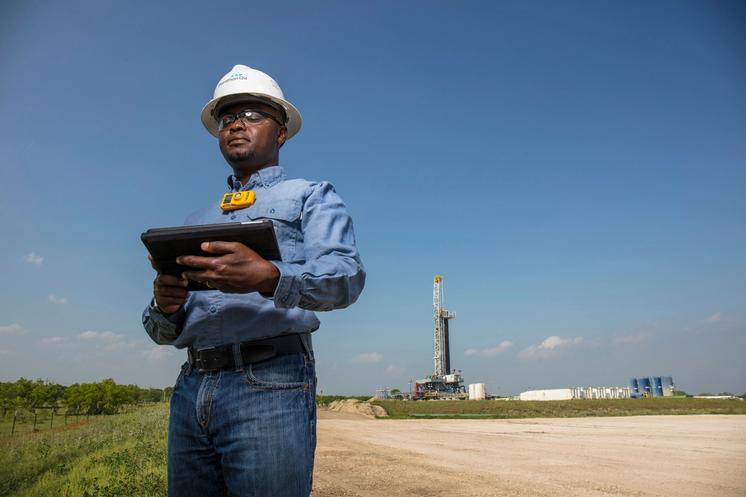
Texas Oil & Gas Association (TXOGA): Providing opportunities
Nearly 1.3 million job opportunities are projected in the oil and natural gas and petrochemical industries through 2030, and minority workers represent a critically vital and available talent pool to help meet the demands of the projected growth and expansion, according to the American Petroleum Institute (API), the only national trade association that represents all aspects of America’s oil and natural gas industry.
This article, written by NNPA Newswire Correspondent Stacy M. Brown, was originally published by the National Newspaper Publishers Association (NNPA) Newswire and BlackPressUSA on July 12, 2019. It is reposted here with the permission of NNPA.
Please note our forward-looking statements disclaimer.
The Texas Oil & Gas Association (TXOGA), a statewide trade association representing every facet of the Texas oil and natural gas industry including small independents and major producers, has for 100 years lived up to its mission of promoting a robust oil and natural gas industry while advocating for sound, science-based policies and free-market principles.
Today, the association says that all 10 sectors of the Texas oil and natural gas industry – from production, to pipelines to refineries – supported 348,570 direct jobs last year.
Those workers earned an average of about $130,000 a year – which was 2.3 times the average pay in other private sectors.

It’s those facts that underscore why many – including African Americans and Latinos – are turning to the oil and natural gas industry for careers they know will pay family-sustaining wages.
Nearly 1.3 million job opportunities are projected in the oil and natural gas and petrochemical industries through 2030, and minority workers represent a critically vital and available talent pool to help meet the demands of the projected growth and expansion, according to the American Petroleum Institute (API), the only national trade association that represents all aspects of America’s oil and natural gas industry.
The industry continuously seeks ways to better diversify its employment makeup, TXOGA said.
The increased implementation of diversity and inclusion programs explain why nationally, African American and Hispanic workers are projected to account for close to 25 percent of new hires in management, business and financial jobs through 2035.
“The oil and natural gas industry provides some of the most high-paying, desirable jobs that offer great benefits and the opportunity to make a difference, and the employees of the Texas oil and natural gas industry are making life better for people here and across the world,” said TXOGA President Todd Staples.
“Many may not know the level of technological innovation and sophistication of the industry or the fact that oil and natural gas impacts nearly every aspect of modern life,” Staples said.
“Oil and natural gas are the building blocks of 96% of the everyday essentials we use. From cell phones and computers, to cosmetics and clothing, to medical devices and contact lenses, the list is lengthy,” Staples said.
“Ingenuity and innovation are increasing efficiency and companies are investing billions of dollars in advanced technologies that are protecting and improving our environment and, with expanded exports of LNG, other countries are improving their air by using more natural gas for electricity,” he said.
But the industry isn’t just made up of the engineers who help make these accomplishments possible. The job opportunities vary widely and require diverse backgrounds including attorneys, architects, truck drivers, welders, carpenters, accountants and human resources specialists, to name a few.
“Whether you specialize in business development, chemistry, construction or public relations, there’s an opportunity for almost every type of background in the oil and natural gas industry,” Staples said.
Collectively, the membership of TXOGA produces in excess of 90 percent of Texas’ crude oil and natural gas, operates over 80 percent of the state’s refining capacity, and is responsible for the vast majority of the state’s pipelines.
In fiscal year 2018, the oil and natural gas industry paid just over $14 billion in state and local taxes and state royalties, funding Texas schools, roads and first responders.

Lee Warren of Marathon Oil, an independent global energy company specializing in exploration and production and a member company of TXOGA, said diversity of background, experiences and thought among the workforce is critical to their success.
Warren said the percentage of minorities among their total staff increased to 33.3% in 2018, and Marathon Oil will continue to focus on ways to improve those metrics even more in the future.
“We broaden the pool of diverse job candidates by reaching out to local student chapters of the Society of Women Engineers, the National Society of Black Engineers, the Society of Hispanic Professional Engineers, LGBTQ Engineers and other organizations. We also use digital methods to recruit at approximately 17 universities to reach diverse job candidates,” she said.
The company also awards scholarships to increase the number of qualified diverse hires in the U.S.
In 2018, Marathon Oil funded college scholarships totaling $280,000 for students to study core disciplines and that included approximately $150,000 for diverse students with a record of academic excellence studying engineering and geosciences at the University of Texas, Texas A&M University and the University of Houston.
In addition to college recruiting, Marathon Oil continues to look for ways to hire, retain and promote more women and under-represented minorities.
Marathon Oil partners with organizations such as Women in Energy, Pink Petro, Hispanic Alliance for Career Advancement (HACE) and Human Rights Campaign to make their members aware of career opportunities with Marathon Oil, Warren said.
“These relationships also give our employees networking and professional development opportunities. For example, we hosted the 2018 Mujeres de HACE Leadership Program and 2019 HACE Executive Leadership tour, where several Marathon Oil Hispanic leaders were among a diverse group that participated in leadership and career development conversations,” Warren said.
“Additionally, when two of our senior executives were recognized as Savoy Magazine’s Most Influential Blacks in Corporate America in 2018, it created ongoing career development and professional networking opportunities for our African American employees. Marathon Oil employees also attended an African American Executive Leadership Council event,” she said.
Further, Texas energy producers are fueling education with oil and natural gas industry dollars — the state received about $2 billion in royalties in 2018 — paid into Texas’ Permanent School Fund and Permanent University Fund.
The Permanent School Fund has reached a new high of $44 billion and is the largest educational endowment in America, according to officials.
The Texas energy industry also pays property taxes to independent school districts, accounting for billions of dollars each year for public schools in the state.
In some communities, the oil and natural gas share of the school district’s tax base tops 70, 80 and even 90 percent, according to data released annually by TXOGA.
The energy community also is cultivating the next generation of STEM graduates and skilled workers with innovative education programs and productive partnerships with some of Texas’ leading colleges and universities, TXOGA officials said.
Jobs that require STEM skills and training currently comprise 20 percent of all jobs in the U.S. economy, according to API.
Current projections anticipate that the STEM economy will grow about 9 percent between 2014 and 2024—faster than the growth rate projected for all other occupations.
As an industry that supports 7.6 percent of the U.S economy and 10.3 million American jobs, many of which are STEM jobs, the oil and natural gas industry has a great interest in better understanding and promoting the relationship between STEM education and employment, officials said.
In addition to the millions of jobs already supported by the industry, IHS projects that through 2035 nearly 1.9 million direct job opportunities will be available in the oil and natural gas and petrochemical industries.
“These achievements and opportunities represent more than bragging rights,” Staples said.
“The women and men who work in the Texas oil and natural gas industry are growing our economy, funding our schools, building our roads, and most importantly, they’re securing our future,” he said.























